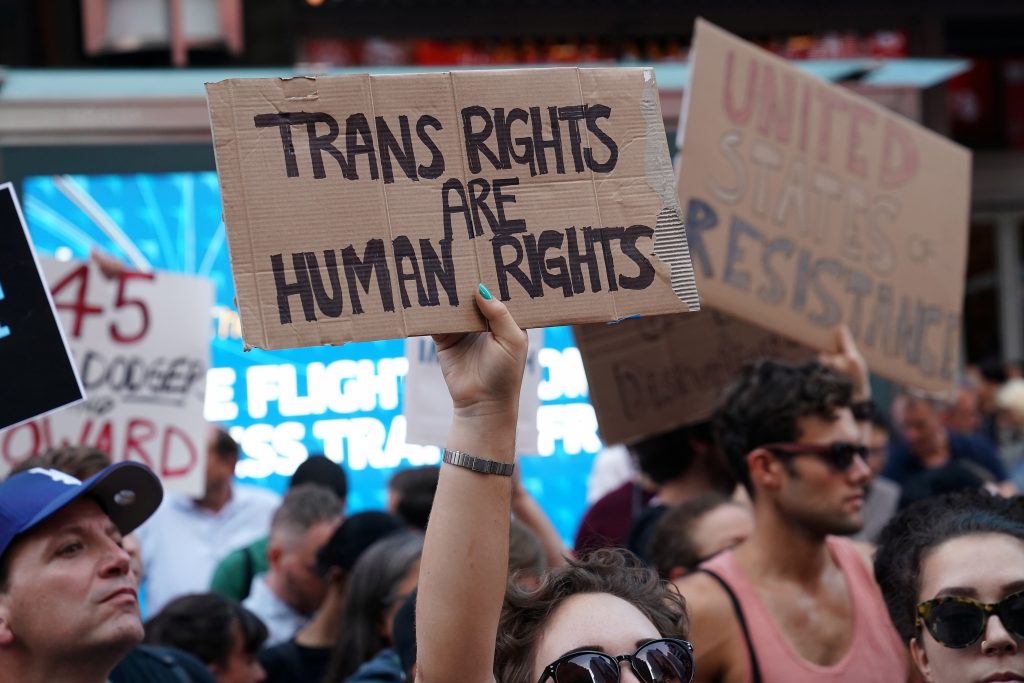
SEATTLE (AP) — Democratic governors in Washington state and Minnesota on Thursday signed into law legal protections for people who travel to those states seeking reproductive and gender-affirming procedures and treatment.
They are the latest blue states to enact safeguards against bans or limits on transgender and abortion healthcare in Republican states.
In Seattle, Gov. Jay Inslee wore a pink tie as he signed a bill that bans other states from using Washington state courts or judicial processes to enforce their bans on abortion and gender-affirming health care. The law blocks related warrants, subpoenas, extradition requests and court orders from other states related to those out-of-state patients.
“Freedom of choice is a health care issue. We are protecting access to health care,” Inslee said.
Halfway across the country, Gov. Tim Walz made Minnesota a refuge for young people coming from other states for gender-affirming care. Numerous other states are rushing to impose restrictions on care for those transitioning. The governor also signed legislation Thursday making Minnesota a sanctuary for abortion patients from other states and banning so-called conversion therapy for LGBTQ+ youth.
READ MORE: Minnesota governor says his state is national model for transgender rights
The Washington law responds to states such as neighboring Idaho that have banned abortions and made it illegal for an adult to help a minor get an abortion without parental consent.
Starting next year, anyone in Idaho who provides gender-affirming medical care for transgender youth could end up a convicted felon, after the state’s Republican governor signed legislation banning the treatment earlier this month.
Similarly, the new Minnesota law is aimed at abortion patients not only from neighboring states, but those from as far away as Texas who have made Minnesota a destination.
Walz and Inslee signed the bills on a day when Republican legislators in Kansas enacted what may be the most sweeping anti-transgender bathroom law in the nation. A day earlier, Montana Republican leaders voted to bar a transgender state lawmaker from the House floor in retaliation for rebuking colleagues who voted to ban gender-affirming care for children.
“Look, I don’t know how hard this concept is to understand,” Walz said. “When someone else is given basic rights, others don’t lose theirs. We’re not cutting a pie here. We’ve giving basic rights to every single Minnesotan.”
Transgender medical treatment for children and teens has been available in the United States for more than a decade and is endorsed by major medical associations.
The need for Washington’s and Minnesota’s shield laws was questioned by anti-abortion advocates and lawmakers, given that abortion protections already exist in state law. At least one Republican legislator suggested Washington should cooperate with out-of-state abortion cases, The Seattle Times reported.
“If we don’t honor the actions of courts, of law enforcement agencies from other states, we run the risk of other states not honoring ours,” Rep. Jim Walsh of Aberdeen said during debate on the bill. The Republican lawmaker also said he was concerned about creating a so-called “abortion tourism” industry in the state.
WATCH: Montana Republicans bar transgender lawmaker from House floor for rest of session
States that generally allow people to end pregnancies, including Washington and Oregon, have provided more abortions on average per month since June last year than they did before the U.S. Supreme Court overturned Roe v. Wade. That’s according to a national tracking effort called #WeCount, which is led by the Society of Family Planning, a nonprofit organization that promotes research on abortion and contraception.
Clinics in Washington have reported 138 more abortions per month since the court decision than in the months before it.
In Minnesota, the chief House author of the trans refuge bill, Democratic Rep. Leigh Finke, of St. Paul, called the signing “an act of great inclusion and celebration” that will protect vulnerable people
“All of us are living our daily lives, trying to simply find space to be who we are, to love who we love, to exist in our schools, to exist peacefully in our families, just find a space for us to be whole,” said Finke, Minnesota’s first openly transgender legislator.
Washington’s new law is among a handful of related measures passed by the Democrat-led Legislature this session and signed by the governor Thursday.
Inslee also signed a bill preventing out-of-pocket costs for abortions under health insurance plans regulated by the state Insurance Commissioner’s Office and a measure increasing consumer protections around how companies collect, share and sell health data including from period-tracking apps.
Another bill specifically protects health care providers from disciplinary action for performing legal abortion or gender-affirming care in the state.
The state also bought a bulk order of the longtime FDA-approved abortion medication mifepristone amid an ongoing lawsuit over the drug by a conservative Christian group. Lawmakers approved a bill authorizing the state Department of Corrections to distribute it.
Inslee had asked lawmakers this session to support changing the state constitution to protect abortion rights but it failed to advance — at least in part because it required some Republican support to meet a two-thirds threshold in each legislative chamber.
Abortion has been legal in Washington state since a 1970 statewide ballot referendum. In 1991, Washington voters approved Initiative 120, which codified Roe into state law.
There are few limits on abortion in Minnesota, where a judge last summer struck down most of the state’s restrictions. Walz then signed a bill in January codifying abortion rights.
Karnowski reported from Minneapolis. AP Videographer Manuel Valdes contributed to this report.
ncG1vNJzZmivp6x7sa7SZ6arn1%2Bjsri%2Fx6isq2egpLmqwMicqmivkai1qrrGraanZZ2eu6%2Bx0qirmmWSmrCwucRmq6uZnqi0prrDnqlmmZ6ZeqKuzquroqeeYsCiusKtrJqqmZrA